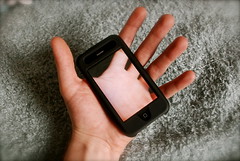There are many ways to be green about our mobile phone use. Some of them will be more plausible for your situation and personality, others less so. Do what you can even if it seems like very little. If everyone does their part, no matter how small, not only will the world be a better place, but it will last for a lot longer as well. Here are some tips for greener mobile and broadband technology use.

Recycle!
That’s right; we’ll start off with a no brainer. When your phone becomes old or you just have to have that new gadget recently released in stores, recycle the one you won’t be using anymore. This doesn’t have to mean giving it away to a homeless person or melting it down for parts. Recycling your old phone could involve good, hard cash! Try looking up your model on Envirofone to see how much it would be worth if you put it back on the market. Reselling your phone is just as green a way to recycle it as any, and the benefits can be even greener.
Alternatively, if there’s a problem with your SIM card or you need to change your number for some reason, see if you can keep your old handset and buy only a new SIM card. This cuts down on your consumption of raw materials and is a great, environmentally conscious way to save money.
Energy Monitoring
Monitor your use of energy with a website such as Electricity Monitor. You can compare products and choose the ones that use the least energy and allow you to leave as tiny a carbon footprint as possible. If your mobile phone uses too much energy, find out if you can cut the amount down a bit by changing your settings, or see if you can afford to invest in a mobile phone that uses less energy.
Green Apps
Really, apps for your smartphone that will somehow make you greener? Ranging from ideas and tips for a greener lifestyle and directories of the most environmentally conscious businesses in your area to product scanners to help you check the environmental impact of any product before buying it, green apps can be an essential way to make your lifestyle more environmentally healthy. There is also an app to help you avoid overcharging your smartphone, which could lead to unnecessary energy usage, and an app to help you become a better, more environmentally conscious driver. There is a full list of Green Apps over at Techcrunch.
Supplier Scrutiny
Do a bit of research on the various service providers available in your area to see which ones have the best record of concern for the environment. The best way to reward green companies is with your business and, although this may sometimes even cost a little more than sticking with the polluting conglomerate monopolies of the world, the peace of mind that you get in exchange, along with the knowledge that you are doing your part to save the planet, will be more than worth the extra expense.
Better Broadband
Find partnerships and businesses offering broadband services that donate part of their proceeds to charity. You can find one of our top overall picks at www.greenmobile.co.uk. Companies that are environmentally conscious not only donate a portion of their proceeds to green charities but also find ways to cut down their energy usage and provide quality services with the least amount of damage as possible done to nature. Many of these offer packages that include a pledge from their company to donate a certain amount to saving the environment. Some also offer on their website helpful tips for lessening your impact on the environment, recycling programs, information about their charity programs, lists of awards they have won, and more.
Guest post by James Helliwell of Broadband Expert

















